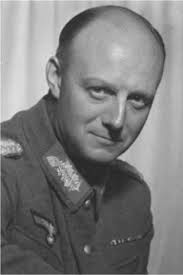
Major-General Henning von Tresckow was one of the most attractive personalities among the conspirators, and one of the bravest. By background he was a Pomeranian gentleman-farmer, who had been brought up in the old Prussian style. Originally an enthusiastic supporter of the Nazis, he was so sickened by what he saw of their atrocities in Poland, where he commanded a regiment, that he utterly broke with them.
Tresckow came of an old Prussian officer family; in 1918 he was a platoon commander. Then he travelled for a bank, going round the world; in 1924 he rejoined the Reichswehr, sponsored by Hindenburg. His original unit was the 1st Prussian Regiment of Foot Guards; from 1936 he served in the famous 9 Infantry Regiment, dubbed ‘I. R. von 9’ by the malicious. He attended the Staff College as a Captain in 1932 and joined the General Staff of the Army in 1936. During the war he was considered by his superiors to be an outstandingly capable officer, far above average, very hard-working and exceptionally capable of taking decisions. Tresckow could not abide anything mean or unjust and there was plenty of both under Hitler’s regime; over the years his opposition became more deep-rooted. In the summer of 1939 he told Fabian von Schlabrendorff that ‘both duty and honour demand from us that we should do our best to bring about the downfall of Hitler and National-Socialism in order to save Germany and Europe from barbarism’.
Ever since Hitler’s intention to attack Russia had become clear Tresckow had set about methodically assembling on to the staff of Army Group Centre men who would help to turn it into an instrument for a coup. He assumed that Germany would be rapidly defeated in Russia and that this would materially assist his plans; in this he found himself sadly disappointed, as he had been over the French campaign. Hitler’s order of December 1941 that the front was to be held at all costs prevented a catastrophic retreat of colossal proportions and so concealed the seriousness of the strategic situation.
In 1943, when Hitler was paying a visit to von Kluge’s headquarters in Russia, von Tresckow gave one of the Führer’s adjutants two bottles for his friend Major-General Stieff at headquarters in Berlin, supposed to contain cognac. They were in fact bombs to blow up Hitler’s plane -but they failed to go off. Tresckow had been first von Bock’s and then von Kluge’s G. S. O. I. or Chief of Operations in Russia. Later he was promoted to be von Kluge’s Chief of Staff. He tried to persuade both these commanders, especially von Kluge, the more vulnerable, to take action against Hitler, but was in despair when von Kluge was transferred to the West and he could not follow.
He tried to persuade Schmundt, with whom he was friendly, to make him Chief of Staff to von Manstein, so that he could convert him. But Manstein refused to have him, writing to Schmundt that Tresckow, while peerless as a Staff Officer, showed a negative attitude to National Socialism. This effectively hamstrung von Tresckow who was forced to await events on the sidelines. When the July Plot failed, he committed suicide in the front line. He had opposed Hitler from revulsion rather than from reasoning, but, as Wheeler-Bennett writes, ‘Of the many who suffered a similar sense of moral outrage he was one of the few who was prepared to translate it into terms of action….’ Shortly before his death von Tresckow, a Christian gentleman, said, ‘God once promised Abraham to spare Sodom should there be found ten just men in the city. He will, I trust, spare Germany because of what we have done, and not destroy her’.
His friend and co-conspirator, Fabian von Schlabrendorff, wrote of him: ‘Tresckow possessed three qualities often found separately but seldom together: he was upright, able and industrious. His noble spirit, the acuteness of his understanding and his capacity for intensive work compelled the admiration of those who knew him. His outstanding quality was his ability to inspire those who surrounded him, to raise them up to his own lofty standard . . . . He threw every atom of his personality into our struggle, and he stands among the most eminent figures in the history of German resistance. . . .’